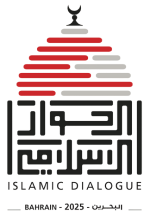Islamic scholars and thinkers from various countries stressed the need to promote a culture of understanding and tolerance among different sects.
They highlighted the pivotal role of scholars and religious authorities in overcoming barriers to dialogue and fostering connections between Islamic sects.
This discussion took place during the second session of the Intra-Islamic Dialogue Conference, held under the theme “One Nation, One Shared Destiny”.
The session was held with the participation of prominent religious and intellectual figures.
The session was moderated by Dr. Abdullah bin Ibrahim Al Shreika, Director of the Centre for Moderation Promotion at Kuwait’s Ministry of Awqaf and Islamic Affairs.
His Eminence Sayyed Ali Al Amin, member of the Muslim Council of Elders, said that differences in scholarly opinions have never been a cause of division among their followers. He emphasised that political exploitation of diversity is what leads to sharp divisions.
He called for enhancing the values of citizenship, justice, and equality among members of the Muslim nation.
He also suggested that establishing joint religious institutes among sects would help reinforce Islamic unity and tolerance.
His Eminence Dr. Nazir Ayyad, Grand Mufti of Egypt and President of the General Secretariat for Fatwa Authorities Worldwide, emphasised that the concept of “citizenship” is not a foreign idea conflicting with Islam but rather a call for mutual understanding, justice, and coexistence.
He pointed out that the Prophet Mohammed embodied this principle in the Madina Charter, which recognised diverse identities and allowed each group its place within a unified state.
His Eminence Dr. Ayyad proposed several measures to address the challenges facing Islamic countries, including declining public trust due to sectarian rhetoric.
He called for the establishment of an independent global association to unify efforts in fostering understanding and promoting citizenship while remaining free from sectarian agendas.
He also emphasised the importance of joint humanitarian initiatives in areas such as poverty alleviation and education to further develop unity and belonging.
His Eminence Sheikh Khalifa Mohammed Al Madani Tal conveyed greetings from His Eminence Sheikh Modane Mounthaqi Ahmed Tal, Custodian of the Tijaniyya Order and President of the Islamic Scholars Association in Senegal.
He commended Bahrain for hosting the Intra-Islamic Dialogue Conference and praised His Majesty the King for supporting initiatives that promote tolerance, peaceful coexistence, respect for diversity, and religious freedoms.
Dr. Ali Abdul Sahib Al Hakim, Secretary General of the Imam Al Hakim Foundation, emphasised that jurisprudential differences are a natural reality and should never lead to conflict or violence.
He highlighted the importance of cultural, intellectual, and social understanding and encouraged even a basic level of familiarity with other sects to foster mutual respect.
Dr. Saeed Shibbar, Secretary-General of the Supreme Council of Scholars in Morocco and professor at Sultan Moulay Slimane University, called for scholars to return to their essential role in promoting inter-sect understanding. He urged them to focus on shared religious principles rather than minor doctrinal differences.
Participants agreed on the need to sustain dialogue among sects rather than limiting it to occasional events.
They emphasised the importance of establishing permanent committees to further develop understanding and inter-sect cooperation.
They also highlighted the need to instill values of tolerance and openness in future generations through education, cultural programmes, and media initiatives.
The session concluded with a call for religious and cultural institutions to collaborate in fostering peaceful coexistence and ensuring continuous dialogue to promote unity across the Islamic world.


